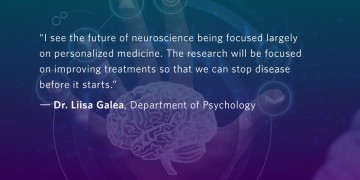
As part of a special feature UBC asked researchers across a range of disciplines at UBC to transport themselves into the year 2115 and imagine what they might be teaching and researching. Here’s what UBC Psychology Professor Liisa Galea had to say.
Q: If you could transport yourself to the future, what would you be teaching/researching in 100 years?
In 100 years I anticipate a future where we have cures for most brain diseases like Alzheimer’s, Parkinson’s and schizophrenia. I see the future of neuroscience being focused largely on personalized medicine. The research will be focused on improving treatments so that we can stop disease before it starts. I imagine a future where we will be researching and teaching inoculations against brain disease that will be tailored to our individual genes and environment. We often argue about whether nature or nurture is contributing to disease but in the future we will understand that it is always a bit of both — a person’s particular DNA, their diet, hormones and experiences will affect their vulnerability to any particular brain disease. Like we see in sci-fi movies, 100 years from now we will have the technology to implement full body scans that take minimal time to detect early warning signs of disease. In the future, I imagine we will be lecturing people on how changes in diet and experiences will reduce the risk for brain disease and how we can repair our DNA to make us less vulnerable to disease and promote brain health.


Q: How will the work you are doing now influence your field in 100 years?
Men and women differ in their vulnerability to develop different brain diseases and in the expression of those diseases. Women are more likely to get Alzheimer’s disease, for instance, while men are more likely to get schizophrenia earlier in life.
My research is vital in understanding how men and women differ and whether their hormone levels influence brain health. This work is an essential first step for developing tailored treatments for brain disease in both women and men. This work leads to the idea that disease treatment may need to differ dependent on the sex of the patient. We are becoming aware that genotype, sex and age contribute to different ways in which our bodies process drug treatments. This means that one particular drug can act differently in two different people. Personalized medicine is already making its way into the future of medical care and it is naïve to think that one-size fits all for medical treatments.
The work I have done over the past 20 years has been to examine how experience, drugs and hormones can affect the female brain. It turns out that pregnancy and mothering affects the female brain long after giving birth and has implications not only for disease vulnerability but also treatments due to differences in how drugs might be processed.
I hope in 100 years we will fully appreciate that individuals require individualized treatments based on their genes and environment.
The Department of Psychology thanks UBC Communications and Marketing for crafting this special feature. This feature originally appeared on ubc.ca.